Ramnarain Ruia Autonomous College is a college affiliated to the University of Mumbai, in Matunga, Mumbai, India. It was established in June 1937. The University of Mumbai granted autonomous status to Ramnarain Ruia College in year 2017. It comprises the Ramnarain Ruia College of Arts and Science which includes B. Voc course in Pharma analytical sciences under granted permission by UGC and the Ramnivas Ruia Junior College of Arts and Science. The college has been awarded a five star rating by the National Assessment and Accreditation Council (NAAC) of India. Also, the NAAC accorded it the A+ Grade and a CGPA of 3.70 out of 4, which is the highest in the state. The college was given the 'Potential for Excellence' status in 2010-11. Additionally, in 2014, Ruia College was adjudged a 'College of Excellence' by the University Grants Commission, New Delhi, and is the first College in the country to have received this status. Ruia college won the award for the best college given by University of Mumbai for the year 2006. It has been winning the trophy in the youth festival organized by Mumbai University for the last six consecutive years.

Dilip Prabhavalkar is an Indian Marathi actor, director, playwright and author. He has a career spanning over four decades in Hindi and Marathi theatre, television and movies. He was awarded the National Film Award for Best Supporting Actor for his portrayal of Mahatma Gandhi in the 2006 Hindi film Lage Raho Munna Bhai.

Sir Ramakrishna Gopal Bhandarkar was an Indian scholar, orientalist, and social reformer.
The Shikshan Prasarak Mandali, Pune, is one of the private educational societies in Maharashtra. It was established in 1883 with the aim of imparting western education in Marathi language but without any help from the then British government. The Nutan Marathi Vidyalaya (NuMaVi) was established by this society in the same year in the memory of Marathi writer and scholar Vishnushastri Chiplunkar. In 1916 it went on to establish the New Poona College for arts.

Ghashiram Kotwal is a Marathi play written by playwright Vijay Tendulkar in 1972 as a response to the rise of a local political party, in Maharashtra. The play is a political satire, written as historical drama. It is based on the life of Nana Phadnavis (1741–1800), one of the prominent ministers in the court of the Peshwa of Pune and Ghashiram Kotwal, the police chief of the city. Its theme is how men in power give rise to ideologies to serve their purposes, and later destroy them when they become useless.Jayant Karve and an American professor Eleanor Zelliot jointly translated Ghashiram Kotwal from the Marathi into English. It was first performed on 16 December 1972, by the Progressive Dramatic Association in Pune. Jabbar Patel's production of the play in 1973 is considered a classic in Modern Indian Theatre.

Achyut Purushottam Kanvinde was an Indian architect who worked in functionalist approaches with elements of Brutalist architecture. He received the Padma Shri in 1974. Padma Shri, also spelled Padma Shree, is the fourth-highest civilian award of the Republic of India, after the Bharat Ratna, the Padma Vibhushan and the Padma Bhushan. Instituted on 2 January 1954, the award is conferred in recognition of "distinguished contribution in various spheres of activity including the arts, education, industry, literature, science, acting, medicine, social service and public affairs". It is awarded by the Government of India every year on India's Republic Day.
Vishwanath Vaman Bapat, also known as Vasant Bapat, was a Marathi poet from Maharashtra, India.

Sukhadeo Thorat an Indian economist, educationist, professor and writer. He is the former chairman of the University Grants Commission. He is professor emeritus in Centre for the Study of Regional Development, Jawaharlal Nehru University. He is an expert on B. R. Ambedkar.
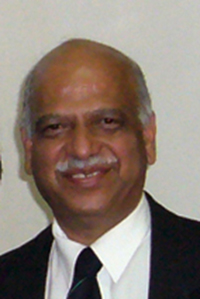
Shridhar Ramachandra Gadre is an Indian scientist working in computational quantum and theoretical chemistry.

Satish Vasant Alekar is a Marathi playwright, actor, and theatre director. A founder member of the Theatre Academy of Pune, and most known for his plays Mahanirvan (1974), Mahapoor (1975), Atirekee (1990), Pidhijat (2003), Mickey ani Memsahib (1973), and Begum Barve (1979), all of which he also directed for the Academy. ‘’ Ek Divas Mathakade एकदिवस मठाकडे ‘’ (2012) and ‘’ ठकीशी संवाद Thakishi Samvad’’ (2024) these two recent plays were directed by Nipun Dharmadhikari and Anupam Barve respectively. Along with Mahesh Elkunchwar and Vijay Tendulkar he is considered among the most influential and progressive playwrights in modern Marathi and Indian theatre.
Ashok Ramchandra Kelkar (1929–2014) was a linguist and critical Marathi writer from Maharashtra, India. He was honoured with the Padma Shri in 2002 and Sahitya Akademi Award for Marathi in 2010.
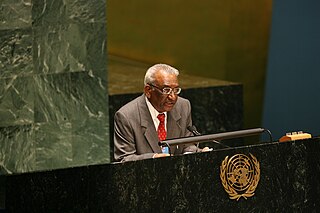
Dr. Janardan Madhavrao Waghmare is an Indian politician and educationist. He has served as a Member of Parliament in the Rajya Sabha from Maharashtra. He was also the President of the Latur Municipal Council.

Narendra Damodar Jadhav is an Indian economist, educationist, public policy expert, professor and writer in English, Marathi and Hindi.
Hemant Laxman Gokhale is a former judge of the Supreme Court of India. He was a chief justice of Madras High Court before being appointed to the Supreme Court of India as a Judge in 2009. He also served as Chief Justice of Allahabad High Court.
Dr. Akshaykumar Malharrao Kale born 27 July 1953, is a critic of modern Marathi poetry, and was Professor and Head of Marathi Department in RTM Nagpur University, Nagpur, India. In the field of criticism of modern Marathi poetry, his contributions have attracted the attention of scholars of Marathi language and literature throughout Maharashtra. He was the president of prestigious 90th Akhil Bharatiya Marathi Sahitya Sammelan held in Dombivali. Kale is also member of general Council of Sahitya Akademi, India.
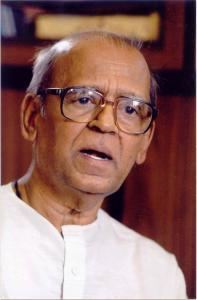
Ashok Damodar Ranade was a scholar musician and ethnomusicologist. Ranade was a vocalist trained in traditional Hindustani Art music. He was a composer constantly experimenting with new uncharted vistas. A pioneer of Cultural Musicology in India, Dr Ranade was a missionary who contributed in enriching India's cultural life in the 21st century.
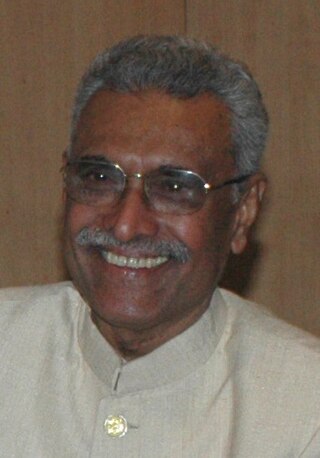
Tharailath Koshy Oommen is an Indian sociologist, author, teacher, and Professor Emeritus at the Centre for the Study of Social Systems, Jawaharlal Nehru University. He was awarded Padma Bhushan, the third highest Indian civilian award in 2008 for his services to the fields of education and literature by the President of India.
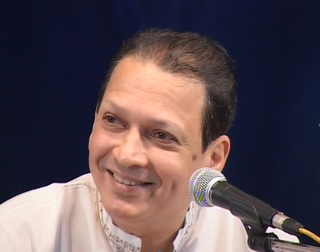
Vidyadhar Oke is an Indian doctor, musicologist, harmonium player, and astrology consultant, who has done research in the use of shrutis (microtones) in Indian classical music and created a unique 22-shruti version of the harmonium.
Ashok Aklujkar is a Sanskritist and Indologist. He is professor emeritus in the Department of Asian Studies at the University of British Columbia. There he taught courses in Sanskrit language and in the related mythological and philosophical literatures from 1969 to 2006. Advanced students have worked under his guidance in the areas of Buddhist and Hindu philosophy, religion, and mythology. His published research is mostly in the areas of Sanskrit linguistic tradition and poetics. He has been a visiting professor at Hamburg, Harvard, Rome, Kyoto, Paris, Oxford and Marburg. He is most well known as the author of the textbook Sanskrit: an Easy Introduction to an Enchanting Language, Richmond, BC: Svādhyāya Publications, most recent edition in 2005. He received an honorary D.Litt from the Rashtriya Sanskrit Sansthan, New Delhi in 2012.

Nandkishore Kapote is a Kathak classical dancer of Indian origin. He is a distinguished guide for one of the PhD programmes at the Tilak Maharashtra University, as well as at the Sri Sri Centre for Kathak Research (SSCARK) at Sri Sri University.












